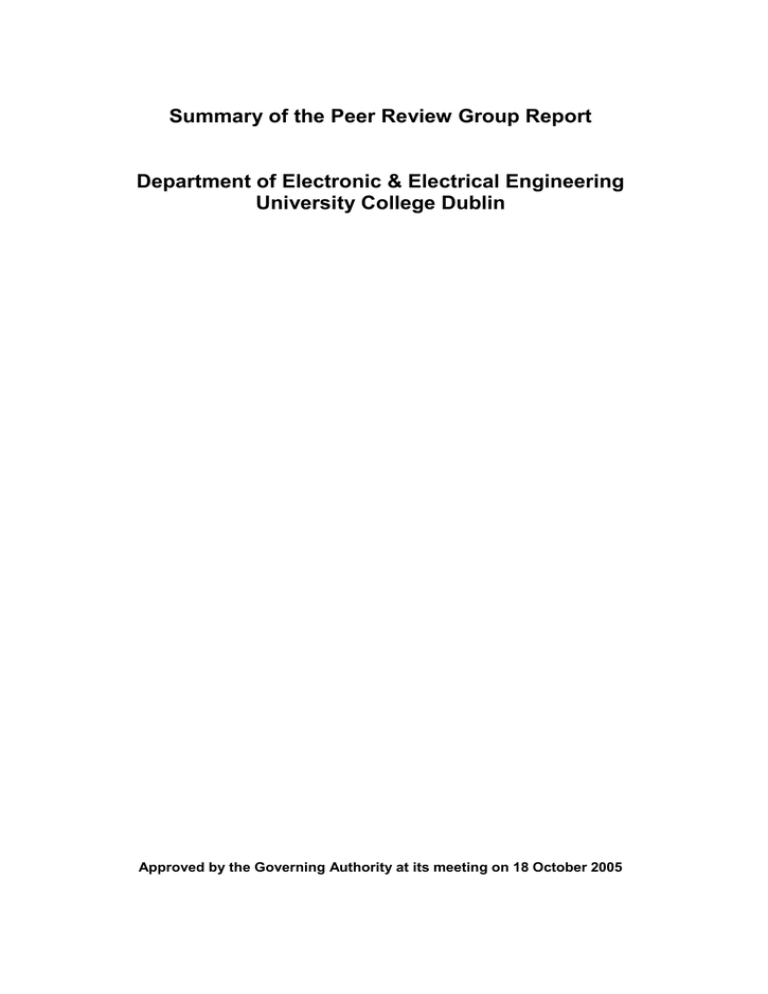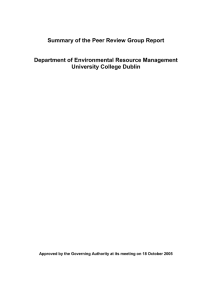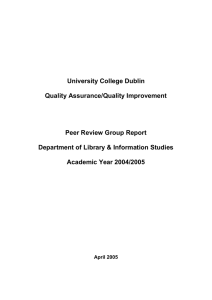Summary of the Peer Review Group Report University College Dublin
advertisement

Summary of the Peer Review Group Report Department of Electronic & Electrical Engineering University College Dublin Approved by the Governing Authority at its meeting on 18 October 2005 Department of Electronic & Electrical Engineering Members of the Review Group (RG) NAME AFFILIATION ROLE Professor Paul Engel Department of Biochemistry, UCD Chair Mr Charles Doherty School of History, UCD Rapporteur Professor Tom Laffey Department of Mathematics, UCD Cognate Professor David Wilcox National University of Ireland, Galway Extern Dr Marissa Condon Dublin City University Extern Professor Dr.-Ing Vladimir Blazek University of Aachen, Germany Members of the Departmental Co-ordinating Committee Professor Thomas J Brazil Mr Liam Carroll Dr James Christie Ms Emer Condon Ms Deirdre Curran Mr Brian Mulkeen Professor Ronan O’Dowd Head of Department Principal Technician Lecturer PhD Student Senior Executive Assistant Lecturer Associate Professor Departmental Details The Department is housed on all four floors of the West Wing of the Engineering Building which is located on the main UCD campus in Belfield. The accommodation consists of Staff Offices, one Departmental Office, Undergraduate Laboratories, Postgraduate Laboratories and Rooms, two Workshops, one Seminar Room and half shares of a Seminar/Tutorial Room, a Postgraduate Room and the Newman Scholars’ Room. The full-time teaching staff of the Department comprises 2 permanent Professors, 4 permanent Associate Professors, 2 permanent Senior Lecturers, 7 permanent Lecturers and 2 Temporary Lecturers. The part-time teaching staff is made up of 1 temporary Professor, 1 temporary Associate Professor and 1 temporary Occasional Lecturer. The Department’s complement of Administrative staff is 1 permanent, full-time administrator and 2 part-time administrators on one-year contracts. The Department’s Technical staff consists of 9 permanent full-time technicians. Other staff members include 7 temporary Postdoctoral Fellows, 3 temporary Research Officers and 7 temporary, part-time Demonstrators. The Department is responsible for the organisation and running of the BE (Electronic) and BE (Electrical) 4-year undergraduate degree programmes. All First, Second and Summary Peer Review Group Report, Department of Electronic & Electrical Engineering, UCD 2 Third Year courses are common to both Programmes. At the beginning of the Fourth Year, students have free choice of following either Electronic or Electrical Engineering Programmes. Staff in the Department provide a total of thirty-nine lecture courses to these two Degree Programmes. In addition, seven lecture courses are provided for other undergraduate Engineering Degree Programmes and one half course to the School of Architecture. Site Visit The site visit took place between 13 and 16 April 2004. The PRG reviewed all aspects of the Department’s work by studying the Self-assessment Report, interviewing those directly and indirectly involved in the various facets of the Department’s work as well as inspecting the facilities and relevant documentation. The PRG met with all members of staff, undergraduate and postgraduate students, postdoctoral fellows, research officers, tutors and demonstrators and the Dean of the Faculty of Engineering & Architecture. The PRG thanked the members of the Department of Electronic and Electrical Engineering (EEE) for their kindness and cooperation during the site visit. In particular the PRG appreciated the courtesy and helpfulness of the Head of Department during the visit. It was clear that the staff and students of all levels participated fully in the QA process. This was already evident in the quality of the SAR given to the PRG in advance of the site visit. A strong commitment to the subject at every level was evident in the open discussions that took place during the visit. The PRG were disappointed that graduates and graduate employers were unable to come to meet with them over lunch. Recommendations of the Review Group All of the comments below emerge in context elsewhere in the Report. However, in summary and for particular emphasis, the PRG’s major recommendations are grouped below according to whom they are aimed at. As this is the last section of the Report and it may read like a list of implied criticisms, we wish to emphasise once again that this is a department that is performing extremely well and has much to be proud of. Our recommendations are made in the hope of helping the Department to do even better and survive its immediate threats and challenges. Recommendations to the University 1. The University authorities should look carefully at the way in which this Department has managed its technician resource. Those of us involved in previous QA surveys are well aware that this is often a problem area, with technical staff feeling undervalued and de-motivated. We were tremendously impressed with the outstanding morale of the technicians in this Department. They are not only helping the Department over many potential difficulties by being flexible and resourceful but have also offered a unique facility to the rest of UCD. This is a resource to be cherished and copied. 2. The University needs to work with the HEA to evolve a realistic policy on capital depreciation. This issue is far from unique to this Department, but in such a capital-intensive area it has major implications for financial planning. 3. This Department should be well placed to benefit further from SFI funding and needs every assistance from the University in pursuing such support. 4. In common with most academic departments this one is sorely stretched in relation to administrative support. This inevitably means that skilled academic time is Summary Peer Review Group Report, Department of Electronic & Electrical Engineering, UCD 3 wasted on clerical duties and is a major issue if UCD wishes to achieve its ambitious goals. 5. The University needs to re-evaluate the damaging consequences of perpetuating the spatial split across the Engineering Faculty. This inhibits desirable natural interactions. 6. The University needs to do better in providing timely building support for upgrading and conversion. In this respect and also in relation to AV and computing facilities the Department has only managed to keep going by diverting resources that should strictly not be used for such purposes. Recommendations to the Department Undergraduate Teaching 1. The Department should move towards a 5-year programme, in which it would be highly desirable to include a period of industrial placement. 2. In reorganising courses the Department should look for opportunities to broaden the students’ range of experience and options by taking units from other departments/Faculties. 3. Likewise there should be an attempt to leave a little more space for the extracurricular activities that make up an important part of a healthy university experience. 4. There should be close scrutiny of certain elements in the course which appear regularly to produce poor results. This should not happen right across a class of good students. Staff involved need to consider both their teaching and their examining and should be encouraged to take full advantage of the University’s improved facilities for helping staff to improve their teaching methods. 5. Whilst we have every sympathy for the motives behind a high Maths requirement on entry, the Department needs to seek evidence as to whether the policy may not be scaring away good applicants as well as weak ones. 6. Efforts to recruit foreign students to make good the current shortfall in home-based students should be redoubled. 7. In the same vein, outreach activities are very important. Good efforts in this area should be sustained and developed further. 8. Serious consideration should be given to strengthening the Electrical Engineering side as this is a relatively distinctive feature of the UCD and is of national importance. Postgraduate Teaching 1. Patterns of supervision appear to be uneven, and there is a need for a more uniform formal system of Postgraduate monitoring. 2. There is too little interaction between groups. This is an important part of the Postgraduate experience and should be encouraged by a regular programme of internal seminars. 3. The Postgraduates need to be better integrated into the social fabric of the Department. 4. Postgraduates should be given training for their demonstrating duties. Research 1. In order to benefit fully from new well-funded schemes for research support (e.g. SFI Centres for Science, Engineering and Technology), the Department will need Summary Peer Review Group Report, Department of Electronic & Electrical Engineering, UCD 4 to demonstrate critical mass in strategically important areas. With this in mind it is important to seek stronger links both within the Department and across departmental and Faculty boundaries. This may require active facilitation either by the Head or by a designated coordinator. General 1. The Department needs to formulate a coherent financial plan for the future. 2. In order to protect its valuable workshop technician resource, the Department should evolve a more formal mechanism of payment for its services to outside users. Response of the Departmental Co-ordinating Committee to the Peer Review Group Report The Departmental Co-ordinating Committee submitted a brief response to the PRG report and this is included as Chapter 8 of the Peer Review Group Report. A copy of the full Peer Review Group Report is available from the Quality Assurance Office. Summary Peer Review Group Report, Department of Electronic & Electrical Engineering, UCD 5





